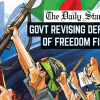Freedom fighter’s definition: Confusion, debate over ordinance
Confusion has emerged following the issuance of a new ordinance redefining the term freedom fighter.
Liberation War researchers and organisations have expressed concern over ambiguities in the revised definitions of Bir Muktijoddha (valiant freedom fighter) and Muktijuddher Shohojogi (associate of the Liberation War).
They are also questioning whether this new definition was necessary at all. The government, however, has dismissed these concerns.
Late Tuesday night, the government issued the Jatiya Muktijoddha Council (Amendment) Ordinance 2025, amending the act of 2022 to include the revised definitions.
The previous law only included a definition of Bir Muktijoddha. The new ordinance introduces at least three new categories: associates of the Liberation War, freedom fighter families and Liberation War associate families.
Some changes have also been made to the definition of the Liberation War itself. In the previous version, political parties that had opposed the Liberation War (Jamaat-e-Islami, Nezam-e-Islami, and Muslim League) were mentioned explicitly.
The amended ordinance now adds the term "then" before the names of these parties, referring to them as the "then Muslim League, Jamaat-e-Islami and Nezam-e-Islami".
Additionally, references to "Father of the Nation Bangabandhu Sheikh Mujibur Rahman" in several places have been omitted in the ordinance.
THE SOURCE OF AMBIGUITY
The definition of Bir Muktijoddha in the ordinance includes the Mujibnagar government.
The definition of Liberation War associate includes all MNAs (Members of the National Assembly) and MPAs (Members of the Provincial Assembly) associated with the Mujibnagar government who later became members of the constituent assembly. Further, all employees and officials of the Mujibnagar government have also been mentioned as Liberation War associates.
Analysts point out that the Mujibnagar government consisted of key national leaders including Bangabandhu Sheikh Mujibur Rahman, Tajuddin Ahmad, Syed Nazrul Islam, Captain M Mansur Ali, AHM Qamaruzzaman, and Khandaker Mushtaque Ahmed, all were members of the constituent assembly.
Thus, under the new ordinance, there is a scope for misinterpretation about their status even though they were central figures in the independence movement.
However, Faruk-e-Azam (Bir Pratik), adviser to the Ministry of Liberation War Affairs, rejected the notion of ambiguity.
Speaking to The Daily Star at his office yesterday, he said, "The roles of Sheikh Mujibur Rahman and Tajuddin Ahmad are far above that of Bir Muktijoddhas. Those who are spreading confusion simply do not understand the ordinance. The Mujibnagar government has clearly been included under the definition of Bir Muktijoddha in the ordinance."
The chief adviser's press wing also issued a statement reacting to reports carried by a number of news outlets, saying they have misinterpreted the definition of freedom fighters.
Media reports claiming the revocation of freedom fighter status for top Mujibnagar Government leaders are entirely "false and misleading", the verified page of the Chief Adviser's Press Wing has said.
Meanwhile, the Central Executive Committee of the Left Democratic Alliance said in a press release yesterday that "the government should refrain from taking any steps that could make the Liberation War and its spirit controversial or questionable."
The alliance also said that the government must urgently clarify its stance regarding the freedom fighter's definitions to resolve the debate surrounding the recently issued gazette on the Liberation War and freedom fighters.
DIFFERENCES OF OPINION WITHIN GOVT
When the proposal to amend the ordinance was sent to the Cabinet Division in May, its legal experts reportedly advised against the revisions, warning that such changes could create confusion.
Sources also told The Daily Star that several members of the advisory council expressed opposition to the amendments during internal meetings.
In response to why the amendment was pursued despite opposition, Faruk-e-Azam said, "It's true that the law went through multiple discussions, reviews, and debates before finalisation. But we proceeded with redefining the terms to uphold the true dignity of the freedom fighters."
In reply to another question, the adviser to the Liberation War Affairs Ministry said, "There are many fake freedom fighters in the current list. We are preparing to launch a large-scale initiative to revise the list. That's why we first took the initiative to redefine the term freedom fighter."
Dr Sarwar Ali, trustee of the Liberation War Museum, said there is no need to classify freedom fighters into categories like "valiant freedom fighters" and "liberation war associates".
"I don't see any need to divide the freedom fighters into two categories. What is more important is that the government should amend the list of fake freedom fighters who were included during the tenure of previous governments. The government should focus on this issue," he told The Daily Star.
Syed Anwar Husain, a former Dhaka University professor of history, said there is ongoing controversy regarding the definition of a freedom fighter, and it is a positive thing that the current government is addressing that.
However, he pointed out that the definition of a freedom fighter has already been established.
"There is a clear and accurate definition of who qualifies as a freedom fighter," he said, adding, "The country would not have been liberated if those who were part of the Mujibnagar government had not actively participated in the Liberation War."


 For all latest news, follow The Daily Star's Google News channel.
For all latest news, follow The Daily Star's Google News channel. 





Comments